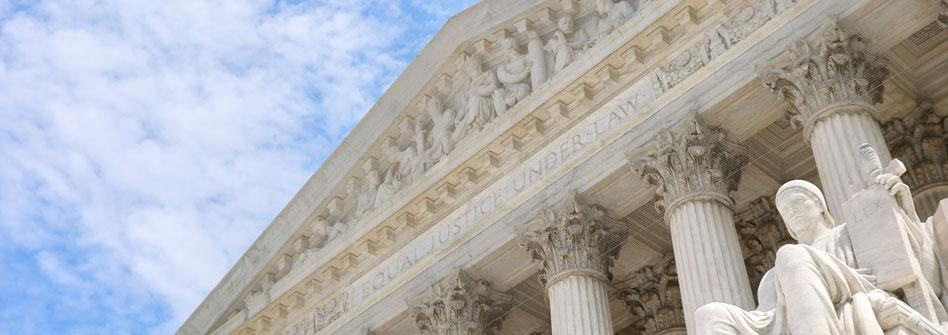
Bankruptcy Law
Our Appellate Group works with trial attorneys to uphold favorable rulings or to seek reversal of rulings where legal error has occurred.
In addition to working with our trial attorneys, we regularly accept referrals from outside attorneys who may not have the experience or time necessary to successfully appeal or defend a decision on their clients’ behalf. When outside counsel retains us, we put our respective practice knowledge and appellate experience to work for your client. When the appeal is over, we return the client to you. Primmer’s experienced appellate lawyers routinely represent clients before the New Hampshire Supreme Court, the Vermont Supreme Court, and the United States Court of Appeals for the First and Second Circuit. We can also assist with other appellate efforts, including appeals to the United States Supreme Court and other federal circuit courts of appeal, should the need arise.
Our appellate team includes Doreen Connor, who is a Fellow of the American Academy of Appellate Lawyers and has handled in excess of 195 appeals. She has been recognized for her appellate practice in Best Lawyers since 2011. Gary M. Burt has handled in excess of 30 appeals and tried more than 200 jury trials. Gary has been recognized by Best Lawyers in America for his trial work since 2011. Gary Franklin, operating out of our Burlington, VT office, has appeared before State and Federal courts in multiple jurisdictions at both the trial and appellate level as well as before arbitration panels.
Our appellate work includes appeals in personal injury, commercial litigation, insurance disputes, family law, administrative appeals, criminal law, zoning, and probate.
Related Posts (View All)
Frequently Asked Questions
In Vermont, filing a discretionary appeal involves a persuasive ten page Memo that explains why the appeal should be accepted. An appeal as of right is taken by filing the Notice of Appeal within 30 days and the payment of entry fee.
To start an appeal, a Notice of Appeal must be filed with the Superior Court Clerk within 30 days after entry of the judgment or order. Cross appeals may be filed within 14 days after the first Notice of Appeal is filed.
A mandatory appeal is initiated by filing the Notice of Appeal with the New Hampshire Clerk of Court within 30 days. The filing fee is $250.00. The Notice of Appeal forms are online. See www.courts.state.nh.us/supreme/forms.
Within 30 days of the Clerk’s Notice on the Final Order. Remember that your first timely filed Motion to Reconsider will toll the 30-day appeal period, but an untimely Motion or a second Motion will not. Cross-appeals must be filed within 10 days of the first appeal.
Representative Decisions
In Re. Petition of New Hampshire Division for Children Youth & Families, 2020 WL 5806535 (September 30, 2020) – On November 12, 2020, the New Hampshire Supreme Court denied the State’s Motion for Reconsideration rendering the Court’s September 30th decision final. In the underlying case, Primmer successfully defended the trial court’s decision that the discovery rule in RSA 508:4 applies to actions brought under RSA 541-B. As a result, C.C., who was a minor in the State’s care, when she was sexually assaulted, was allowed to proceed with her negligence action against the State. The Court rejected the State’s claim that the sovereign immunity waiver in 541-B:14 required C.C. to file suit within three years of her injuries, irrespective of her knowledge of the State’s potential responsibility for her damages under the discovery rule.
The Supreme Court found the tolling provisions in Chapter 508 applied to C.C.’s action against the State because the statute of limitations in 508:4 (three years) is the same as the statute in the sovereign immunity waiver, RSA 541-B. The Court also found that it would be manifestly unfair to foreclose an injured person’s cause of action before they have a reasonable chance to discover its existence. They also noted that when reviewing the constitutionality of the waiver in RSA 541-B, the Court had advised the Legislature that it must include a discovery rule.
Teatotaller, LLC v. Facebook, In. 2020 WL 4248507 (July 24, 2020) – On July 24, 2020, the Supreme Court concluded the Communications Decency Act (CDA) would bar the plaintiff’s claims against Facebook if Facebook had deleted the plaintiff’s account information as an interactive computer service and the plaintiff sought to treat it as the publisher or speaker of information provided by another information content provider. The Supreme Court agreed that the first and third prong of the CDA had been met, but there was an insufficient record on which to determine whether Teatotaller sought to hold Facebook liable as a publisher or speaker.
Teatotaller’s small claims complaint alleged negligent deletion of its account; however, on appeal Teatotaller alleged breach of contract. The Court found that if Teatotaller’s claim were premised upon Facebook’s decision to remove its Instagram account, including all content, data and followers, its claim would require the Court to treat Facebook as a publisher, thus immunizing it. However, to the extent that Teatotaller’s claim was based upon specific promises that Facebook may have made in its terms of use, Teatotaller’s claim may not require the Court to treat Facebook as a publisher. Because it was not clear on the face of Teatotaller’s complaint whether the second element of the CDA immunity test had been met, the Court remanded the case. The Court noted, however, that Teatotaller’s breach of contract claim may ultimately fail either on the merits or under the CDA.
John O’Donnell v. Allstate Indem. Co., _N.H. (May 22, 2020). The Supreme Court affirmed summary judgment in Allstate’s favor. The insured claimed Allstate was required to provide $1 Million in Underinsured Motorist Coverage because it did not obtain a written waiver when the insured reduced his Umbrella Liability limits from $2Million to $1Million. The Supreme Court concluded the written Uninsured Motorist waiver, which the insured signed when he first purchased his Allstate umbrella remained in force and precluded coverage.
In the Matter of Ginger and William Allen, 2019-0241 (March 9, 2020). The N.H. Supreme Court affirmed the Circuit Court order dismissing the Appellant’s motion to modify child support and alimony after it concluded the Appellant had not incurred a substantial adverse change in income. The Court also affirmed the lower court order awarding our client attorney fees as the lower court found the Appellant’s claims “lack[ed] a basis in fact.”

